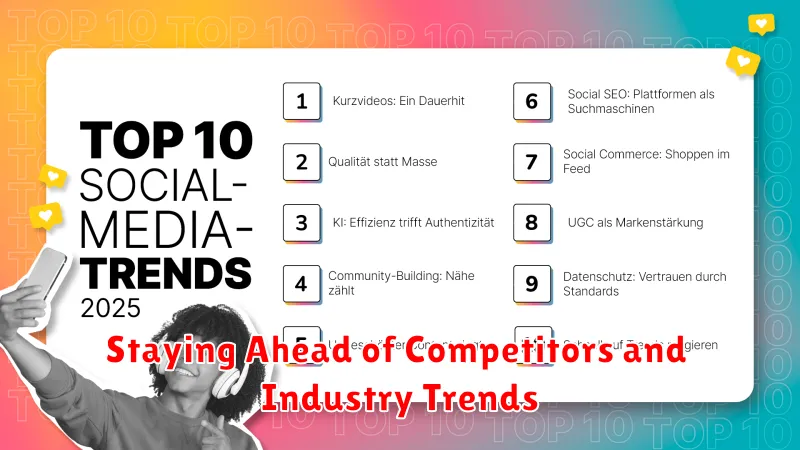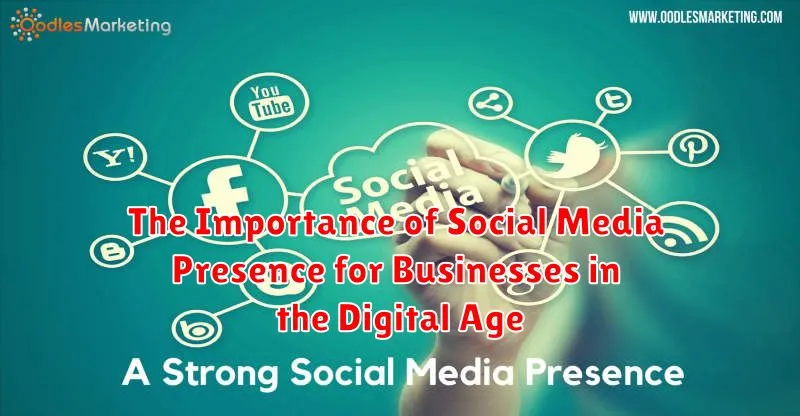In today’s interconnected world, a robust social media presence is no longer optional but rather a critical component of any successful business strategy. The digital age has fundamentally transformed how businesses interact with their target audiences, making social media marketing an indispensable tool for reaching potential customers, building brand loyalty, and driving growth. Establishing a strong online presence across various platforms allows businesses to connect with customers on a personal level, cultivate a sense of community, and ultimately, thrive in the competitive digital landscape. This article will explore the paramount importance of social media presence for businesses in the digital age, examining its multifaceted benefits and providing insights into effectively leveraging these platforms for business success.
From enhancing brand visibility and driving website traffic to generating leads and boosting sales, the advantages of social media for business are numerous and far-reaching. Social media platforms like Facebook, Instagram, Twitter, and LinkedIn provide unparalleled opportunities for businesses to engage with their target audiences, build meaningful relationships, and establish themselves as industry leaders. By understanding the intricacies of social media management and strategically crafting engaging content, businesses can harness the power of social media to achieve their marketing goals and achieve sustainable growth in the digital era. Ignoring the importance of social media presence in today’s dynamic marketplace can be detrimental, potentially leading to missed opportunities and a decline in competitiveness.
Building Brand Awareness and Recognition
In today’s digital landscape, a strong social media presence is crucial for building brand awareness and recognition. Social media platforms provide businesses with unparalleled opportunities to reach a vast audience and cultivate a recognizable brand identity. Consistent posting and engagement are key to staying top-of-mind with potential customers.
By sharing high-quality content that resonates with your target audience, you can establish a distinct brand voice and personality. This helps differentiate your business from competitors and fosters a sense of familiarity with consumers. Utilizing relevant hashtags and engaging in conversations within your industry can further expand your reach and increase brand visibility.
Visual elements also play a significant role in building brand recognition. Developing a cohesive visual identity across your social media profiles, incorporating your brand logo and colors, helps create a consistent and memorable brand experience for your audience.
Connecting with Your Target Audience and Increasing Customer Engagement

Social media platforms provide unprecedented access to your target audience. By understanding your demographics and their online behavior, you can tailor your content to resonate with their interests and needs. This targeted approach fosters a sense of community and encourages interaction.
Engaging content, such as polls, quizzes, and interactive posts, stimulates conversations and strengthens the bond between your brand and your customers. Asking questions and responding to comments demonstrates that you value their input and fosters a sense of loyalty. This active participation cultivates a two-way communication channel, transforming passive consumers into active brand advocates.
Regularly monitoring social media channels allows you to identify trending topics and participate in relevant conversations. This real-time engagement demonstrates that your business is current and responsive, further solidifying your brand’s presence in the minds of your target audience.
Driving Website Traffic and Generating Leads
Social media platforms offer a powerful way to drive traffic to your website and generate valuable leads. By strategically sharing engaging content and incorporating calls to action, businesses can guide their social media followers to their website where they can learn more about products, services, and offerings.
Promoting exclusive content, running contests, and offering special discounts through social media channels can incentivize visits to your website. Trackable links and UTM parameters provide valuable insights into which social media platforms are most effective in driving traffic and converting leads. This data allows for optimization of campaigns and a more focused approach to lead generation.
Lead generation forms integrated within social media platforms can streamline the process of capturing customer information. By simplifying the process for potential customers to express interest, businesses can effectively build their lead pipelines and nurture those leads towards conversion.
Establishing Thought Leadership and Building Credibility
Social media provides a powerful platform for businesses to establish themselves as thought leaders in their respective industries and build credibility among their target audience. By consistently sharing insightful and valuable content, businesses can demonstrate their expertise and knowledge, positioning themselves as trusted sources of information.
Sharing original research, data-driven insights, and informed opinions can significantly enhance a business’s credibility. Participating in relevant industry discussions and offering unique perspectives further solidifies their thought leadership position.
Creating and curating high-quality content, such as blog posts, articles, white papers, and webinars, allows businesses to showcase their deep understanding of industry trends and challenges. This content can then be shared across social media channels, attracting a wider audience and establishing the business as a go-to resource for valuable information.
Interacting with followers by responding to comments and questions, and participating in relevant conversations demonstrates a commitment to engagement and further builds trust and credibility. This consistent engagement helps foster a loyal community around the brand and reinforces its position as a thought leader.
Boosting Sales and Revenue Through Targeted Campaigns
Social media platforms offer powerful advertising tools that enable businesses to reach specific demographics, interests, and behaviors. By leveraging these targeting capabilities, you can create highly effective campaigns designed to boost sales and revenue. Paid social media advertising allows you to put your products or services directly in front of potential customers who are most likely to be interested.
Targeted campaigns can take various forms, including promoting special offers and discounts, highlighting new product releases, and running contests or giveaways. These campaigns can be optimized for specific objectives, such as increasing website clicks, generating leads, or driving direct sales. By focusing your efforts on the right audience, you can maximize your return on investment and achieve significant growth.
Precise targeting also allows for retargeting efforts. You can re-engage users who have previously interacted with your website or social media profiles, reminding them of your offerings and encouraging them to complete a purchase.
Managing Online Reputation and Handling Customer Service
Social media platforms serve as a crucial channel for managing your business’s online reputation. Actively monitoring social media conversations allows you to address any negative feedback or misinformation promptly.
Responding to comments and reviews, both positive and negative, shows customers that you value their feedback and are committed to providing excellent customer service. This public display of engagement can build trust and strengthen your brand’s image.
Social media also provides an avenue for proactive customer service. Customers frequently utilize social media channels to ask questions or seek assistance. By offering timely and helpful responses, businesses can resolve issues efficiently and demonstrate their commitment to customer satisfaction. This approach can turn potentially negative experiences into positive ones, fostering loyalty and advocacy.
Designated social media teams can be trained to handle customer inquiries effectively and adhere to established brand guidelines for communication. This ensures consistency and professionalism across all interactions.
Staying Ahead of Competitors and Industry Trends

In today’s dynamic digital landscape, social media provides a crucial platform for businesses to monitor competitors and stay informed about industry trends. Competitive analysis on social media allows businesses to understand their competitors’ strategies, strengths, and weaknesses. By observing their content, engagement levels, and target audience interactions, businesses can gain valuable insights to refine their own social media approach.
Social listening tools enable businesses to track industry keywords, hashtags, and conversations relevant to their niche. This provides a real-time understanding of emerging trends, customer preferences, and industry developments. By staying informed, businesses can proactively adapt their strategies, products, and services to meet evolving market demands.
Furthermore, social media platforms are valuable resources for identifying influencers and thought leaders within specific industries. Engaging with these individuals can help businesses expand their reach, build credibility, and access new customer segments. By actively participating in industry discussions and sharing valuable insights, businesses can position themselves as leaders and innovators.
Measuring the Success of Your Social Media Efforts
Measuring the effectiveness of your social media strategy is crucial for optimizing campaigns and demonstrating return on investment (ROI). It’s not enough to simply be present; you must understand what’s working and what’s not. This involves tracking key performance indicators (KPIs) aligned with your business objectives.
Key metrics often include reach (how many users saw your content), engagement (likes, comments, shares), website traffic originating from social media, lead generation, and conversion rates. Analyzing these metrics helps determine which content resonates with your audience, which platforms are most effective, and the overall impact of your social media presence.
Utilize analytics tools provided by each platform, as well as third-party social media management platforms, to gather and interpret data. Regularly reviewing these insights enables you to refine your strategy, allocate resources effectively, and ultimately achieve your business goals through social media.
Establish a reporting schedule to track progress and identify areas for improvement. This consistent monitoring ensures your social media efforts contribute meaningfully to your overall business success.

